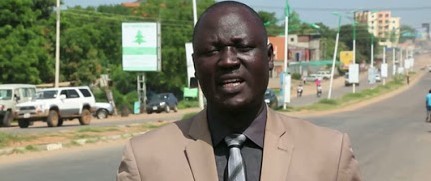The South Sudan National Security Services (NSS) on Wednesday stormed a joint media stakeholders’ press conference in Juba and ordered it to halt.
The joint media stakeholders called for the recognition of the media as a key stakeholder in the constitution-making process and demanded media representation in the process. They also called for an observer role in the legislative process in the country, in addition to its reporting role.
Though the NSS agents arrived towards the tail-end of the conference, they demanded authorization from the Media Authority for the briefing to continue.
Speaking to Radio Tamazuj, Patrick Oyet Charles, the President of the Union of Journalists of South Sudan, says the NSS agents misunderstood the presser's agenda.
“I believe there was a misunderstanding from the security apparatus because the way we look at it is that we are journalists who work with media houses and when we journalists are meeting in this case where we are consulting each other, it is our understanding that when we are meeting we do not have to get authority from the Media Authority to conduct the meeting,” Oyet stated.
For her part, Josephine Achiro, the Executive Director for COMNeTs who also doubles as the Association for Media Development in South Sudan (AMDISS)s’ Secretary-General says the security agents violated the right to freedom of expression.
“This is a total violation of the press freedom and the freedom of expression because we are supposed to express our views freely, and then maybe they (security) wait for the outcome. Because if we are going to take our position paper to the parties to the peace agreement, it is up to them to accept it or not because we are not going to force them by force for us (media) to be there,” Achiro stressed.
Achiro further stressed the need to have the media included in the permanent constitution-making process.
“We want to be included in the constitution-making process so that the constitution speaks for us. So that each and everything being done is in line with the constitution,” Achiro asserted.
The government launched a permanent constitution-making process last May. South Sudan currently operates with the 2011 transitional constitution amended by the Transitional Constitution Act 2013.




